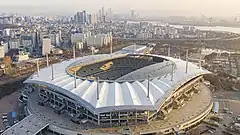Football in South Korea
Football in South Korea is run by the Korea Football Association. The association administers the national football team as well as the K League. Football is one of the country's most popular sports along with baseball.[1][2]
| Football in South Korea | |
|---|---|
 Seoul World Cup Stadium in 2020 | |
| Country | South Korea |
| Governing body | Korea Football Association |
| National team(s) | Senior team (♂, ♀) Under-23 team Under-20 team (♂, ♀) Under-17 team (♂, ♀) Under-14 team (♂, ♀) Universiade team |
Club competitions | |
International competitions | |
| |
Beginning
In ancient times, Silla, one of Three Kingdoms of Korea, had a ball game called "Chuk-guk" (Hangul: 축국, Hanja: 蹴鞠) very similar in form to contemporary football. However, Koreans first saw the present version of football in 1882 when British crew members played a game while their vessel, HMS Flying Fish, was visiting the Port of Jemulpo.[3][4]
Regularized football introduction was the time of adoption of football as physical education course at National Seoul Foreign Language School in 1904 and the first official match in Korea was the game between Korea Sports Club and Korea YMCA at Seoul Dongdaemun Stadium in 1905.
In 1902, after the establishment of a football team at Paichai Academy in Seoul, there was a footballing boom throughout Korea. that saw many football clubs and school teams formed by the 1910s. Also in Seoul, many famous football clubs like Youth Buddhist Club, Geongang Gurakbu (Health Club) and Joseon FC (Korean unofficial national team before their independence) were founded between the 1910s and 1920s, and they usually had a rivalry against football clubs in Pyongyang, the second biggest city in Korea. In 1933 Kyungsung FC, named according to Seoul's alternate name, was formed and it was the only Korean club which won the Emperor's Cup in Japan.
The first Korean national football tournament named All Joseon Football Tournament was held in 1921 after Joseon Sports Council was created in 1920. In 1928, Joseon Referee Association was created. Before the creation of the Joseon Football Association in 1933, two organizations hosted the competitions. The creation of Joseon Football Association led to the establishment of several prominent club sides on the peninsula as Korean football began to enter a different form. The All Joseon Football Tournament, which had until 1932 been a tournament almost exclusively between academic institutions, included a "professional" class from 1933 which, along with the immensely popular Kyungsung (currently Seoul)–Pyongyang inter-city football series, raised interest levels in the sport greatly.[4]
After independence
The Korea Football Association was reinstated in 1948, following the establishment of the Republic of Korea. The KFA became a member of FIFA, the international football governing body, in 1948. The same year, the South Korea national football team made its international debut at the Olympic Games in London. The KFA joined the Asian Football Confederation (AFC) in 1954.[3] The first Korean player to earn international recognition was Cha Bum-kun, who played in the German Bundesliga in the 1980s. The other stars were Hong Myung-bo who is the Bronze ball winner of the 2002 FIFA World Cup, Park Ji-sung who played for PSV Eindhoven and Manchester United during the 2000s,[5] and Son Heung-min who scored a total of three-digit goals in Bundesliga and Premier League.
Related articles
See also
References
- "South Korean Teams Fight for Attention at Home". The New York Times. Retrieved 2 February 2014.
- "News". AsiaOne. Retrieved 14 July 2016.
- "KFA's summarized history of South Korean football". KFA. Archived from the original on 15 September 2012.
- Trevena, Mark. "The British Influence On Korean Football". ROKfootball. Archived from the original on 17 July 2009.
- Jackson, Jamie (1 March 2009). "Manchester United's Park Ji-sung: the player's player". The Guardian. Retrieved 14 July 2016.
External links
- Shin Myung-chul: Histories of Korean sports by event - Football (in Korean)